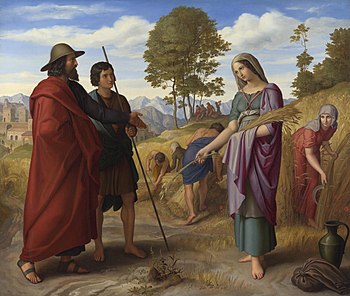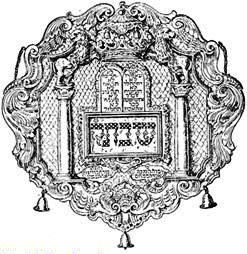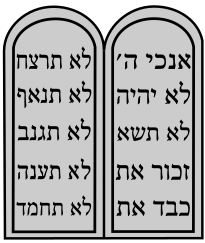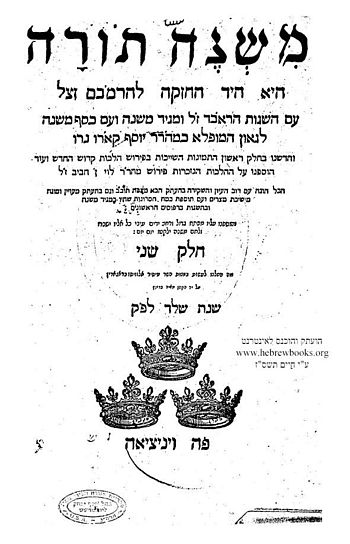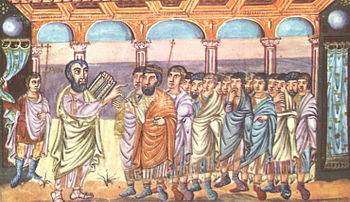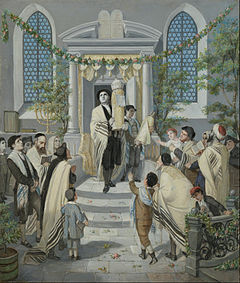
Shavuot by Moritz Daniel Oppenheim
At the end of the first weekly Shabbat of the seven weekly Shabbats, in between firstfruits and the Feast of Weeks the close friends of rabbi Jeshua had the shock of their life, having come to hear that their beloved master who was killed at the stake, now had disappeared from the grave. From the heavenly malach they heard that יהושע {Jeshua} was risen form the dead. Later they also had come to see him again, him also showing his wounds to proof to them he was not a ghost or spirit. Them knowing that God is a Spirit, came to hear from their beloved master teacher that he (Jeshua) was going back to Him and they saw him lifted in the air. When the moed of Shavuot was fully counted by the omer, they were all with one accord in one place. The talmidim knew they had to continue to study Torah and remember those Fifty days after Pesach and remembering how the Most High had revealed Himself and given the mitzvot to Moshe so that he could deliver them to the People of God.
For the talmidim and us it might be not a negligible fact that on the day of the revelation at Sinai they also remembered the death of of King David and the death of the successor of King David, the risen King of kings, from King David’s Tribe, the son of man and son of God, יהושע {Jeshua} (Jesus Christ). Their master had revealed the Words of God and made the mitzvot clear, so that they too could go into the world and explain them.
Today we remember that the entire people of Israel (600,000 heads of households and their families), as well as the souls of all future generations of Jews, heard God declare the first two of the Ten Commandments and witnessed God’s communication of the other eight through Moses. Following the revelation, Moses ascended the mountain for 40 days, to receive the remainder of the Torah from God.
At Sinai, the Elohim rescinded the “decree” and “divide” (gezeirah) that had been in force since the 2nd day of creation separating the spiritual and the physical into two hermetic worlds; from this point on,
“the higher realms could descend into the lower realms, and the lower could ascend to the higher.”
Thus was born the “mitzvah” — a physical deed that, by virtue of the fact that it is commanded by God, brings Godliness into the physical world.
The deaths of two of the greatest figures in history serves as a reminder to us that revelation was not just a moment but a continuing process; that new faces of the infinitely meaningful Torah have always been revealed at the critical moments of our religious development; and that Sinai posed an immense challenge to the Jewish people to which we continue to try to rise.
David, a descendent of Judah the son of Jacob as well as of Ruth, a Moabite convert to Judaism, was anointed King of Israel by Samuel in 878 BCE. All future legitimate kings of Israel were David’s descendants. Mankind was told it would be from him that the Moshiach or the messiah, would come, who will “restore the kingdom of David to its glory of old.”
These two figures stand at key points in the development of this response, and thus have a special relationship to Shavuot.
“lower (worlds) shall ascend to the higher, and the higher descend to the low.”
It is significant that though the Midrash quotes God as saying
“I shall take the initiative,”
and though the descent of God in fact preceded Moses’ going up, it still mentions the ascent of the lower worlds before the descent of the higher. This is because the ascent of the low was the ultimate purpose of the giving of the Torah, and the ultimate purpose is the last tobe realized. Though Moses’ ascent came after God’s descent, it was nonetheless of great importance. God’s initiating step was needed beforehand, before man could rise to meet Him.
Only by the liberation of the people from slavery man could become a free person able to aim for the promised Land and preparing themselves for entering the Kingdom of God. That entrance also made possible for the goy, they now also liberated from the curse of death like all people became liberated from death by the death of the descendant of King David, the long awaited Messiah, Jeshua who by the allowance of the Most High God, may now be seated next to God to be a mediator between God and man.
The Elohim had come down to the world to give His Word, in two senses, the stone tablet and the fulfilment of His promise in the Gan Eden, when man had rebelled against God. That Word spoken in that Royal Garden had become in the flesh and the talmidin had been close to it, feeling how it brought in them the Word also to live.
Like in the time of Moshe the effect of the giving of the Word was felt within the world, now that Word given also would have its effect unto many generations still coming after the talmidin.
The Midrash may say
“No bird called, no bird flew” and “the voice which came from G-d had no echo”
because it was absorbed into the very texture of the world. But from the Shavuot 30 CE change came over the world, several disciples of rabbi Jeshua having shaken by the sound from the shamayim as of a groaning Ruach, which filled all the Bayit where those scaredy-cats had taken their refuge.
For those talmidin it was now clear that the Torah was no longer “in heaven,” but that the Word of God had descended to earth. For that reason, grasping that the world could face a new world, the beloved disciple of Jeshua, the apostle Jochanan (John)wrote about the word having come in the flesh.
John 1:1-5 OJB
Besuras Hageulah According to YochananBereshis (in the Beginning) was the Dvar Hashem [Yeshayah 55:11; Bereshis 1:1], and the Dvar Hashem was agav (along with) Hashem [Mishle 8:30; 30:4], and the Dvar Hashem was nothing less, by nature, than Elohim! [Psa 56:11(10); Yn 17:5; Rev. 19:13] (2) Bereshis (in the Beginning) this Dvar Hashem was with Hashem [Prov 8:30]. (3) All things through him came to be, and without him came to be not one thing which came into being. [Ps 33:6,9; Prov 30:4] (4) In him was Chayyim (Life) and the Chayyim (Life) was the Ohr (Light) of Bnei Adam. [Tehillim 36:10 (9)] (5) And the Ohr shines in the choshech [Tehillim 18:28], and the choshech did not grasp it. [Yeshayah 9:1]
There had been man like the baptiser John who tried to shed light, but the true light that could enlighten everyone was his cousin who came into the world by the Ruach of the Most High, but the talmidin could be witnesses that the world did not recognize him who was sent by God.
Moshe had received the stone tablets and given them to the people, who took a very long time to come to make out why they had to follow those mitzvot and how they had to follow them.
Only afterwards did the work begin of refining, sanctifying and raising the world in spiritual ascent. This was the worship of the Jewish people, to turn the world into a “vessel” receptive of God. The possibility of this achievement was created at Sinai; the actuality began later.
Just as the descent of God to the world began with Abraham and culminated in Moses, so the ascent of the world to God began after the giving of the Torah and reached its climax in the wise kings David and Shlomo (Solomon), his son, who in building the Temple took the Jewish people to a new apex in their upward climb to God. In line with the great kings the world received a 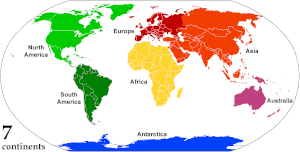 high-priest who would not only be king of the United Monarchy, with the northern Kingdom of Israel and the southern Kingdom of Judah, but of the whole world with its seven continents (Asia, Africa, North America, South America, Antarctica, Europe, and Oceania).
high-priest who would not only be king of the United Monarchy, with the northern Kingdom of Israel and the southern Kingdom of Judah, but of the whole world with its seven continents (Asia, Africa, North America, South America, Antarctica, Europe, and Oceania).
With the advent of David came two new developments. Firstly, he was the first king to rule over the whole of Israel (unlike Saul, who according to the Midrash {Bamidbar Rabbah, ch. 4.} did not rule over the tribe of Judah), and the dynasty was entrusted to him in perpetuity:
“The kingship shall never be removed from the seed of David.’ {1 Chronicles 29:2 ff.)
Jeshua being that seed has now taken over the dominion. the apostle John and his comrades could see that now the time for a special kind of monarchy had entered this system of things. Through the intermediary of kingship, Israel has an obedience to God which is both total and extending to every aspect of their being. Now the Kingdom of Israel shall have to come to witness their new king for ever. Though the world shall not want to recognise this sent one from God, many objecting such a position to a person who was once a man of flesh and blood. (Lots of Christians still take him as being their god and want to believe Jesus is God.) They all shall have to come to accept Jesus to be the mediator between God and man and the High Priest in the order of Melchisedec.
Thus we can see the difference between the acceptance of the Torah at Sinai and the obedience to God involved in the idea of Kingship, which David initiated and with the kingship of this King of kings, the sent one from God. The revelation at Sinai was an act of God:
“I shall take the initiative.”
It did not come from within the hearts of the people. And so it did not affect their whole being absolutely. But kingship does come from the people — their obedience is the source of the king’s authority. David’s reign signifies a new phenomenon: The voluntary, inward acceptance by the people of an absolute authority over them.
Ever since the Torah was given, the world was given a possibility to come into unity with God. Jeshua being revealed from above should be the eye opener for the world, him being the way to God, and the one who explained how we have to interpret the Law of God.
The Lubavitcher Rebbe urged that all children — including infants — should be brought to the synagogue on the 1st day of Shavuot to hear the reading of the Ten Commandments in re-enactment of the Giving of the Torah at Sinai. Our sages relate that when God came to give the Torah to the people of Israel, He asked for a guarantee that that they will not forsake it.
“The heaven and the earth shall be our guarantors,”
said the Jews, but God replied that
“they will not last forever.”
To this the people replied
“Our fathers will guarantee it,”
But the Elohim said that
“they are busy.”
It was only when we promised that
“our children will guarantee it”
that God agreed,
“These are excellent guarantors.”
therefore we should make sure that our children do come to hear the mitzvot and shall have the Word of God imprinted in their hearts.
+
Preceding articles
Looking at the time when the Torah was given
9 Adar and bickering or loving followers of the Torah preparing for Pesach
++
Additional reading
- Matthew 1:1-17 The Genealogy of Jesus Christ
- Jesus is risen
- Restoration Scriptures True Name Edition Matthew Chapter 28
- The Acts Of The Sent Ones Chapter 2
- Nazarene Acts of the Apostles Chapter 2 v1-13 Working Spirit
- Hebraic Roots Bible Book of The Acts of the Apostles Chapter 2
- For those who believe Jesus is God
- God’s salvation
- Jesus Messiah
+++
Further reading
Text of Book of Ruth and its connection to Shavuot





